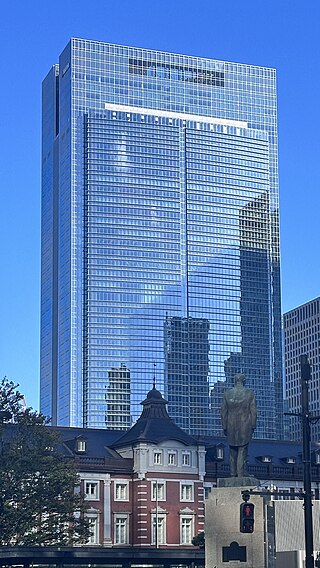
In organic chemistry, isocyanate is the functional group with the formula R−N=C=O. Organic compounds that contain an isocyanate group are referred to as isocyanates. An organic compound with two isocyanate groups is known as a diisocyanate. Diisocyanates are manufactured for the production of polyurethanes, a class of polymers.

Petrochemicals are the chemical products obtained from petroleum by refining. Some chemical compounds made from petroleum are also obtained from other fossil fuels, such as coal or natural gas, or renewable sources such as maize, palm fruit or sugar cane.

Borsod–Abaúj–Zemplén is an administrative county in north-eastern Hungary, on the border with Slovakia. It shares borders with the Hungarian counties Nógrád, Heves, Hajdú–Bihar and Szabolcs–Szatmár–Bereg. The capital of Borsod–Abaúj–Zemplén county is Miskolc. Of the seven statistical regions of Hungary it belongs to the region Northern Hungary.

Tiszaújváros is an industrial town in Borsod-Abaúj-Zemplén county, Northern Hungary, 35 km (22 mi) south-east of Miskolc, near the river Tisza.

Kazincbarcika is an industrial town in Borsod-Abaúj-Zemplén county, Northern Hungary. It lies in the valley of the river Sajó, 20 kilometres from the county capital, Miskolc.

Toluene diisocyanate (TDI) is an organic compound with the formula CH3C6H3(NCO)2. Two of the six possible isomers are commercially important: 2,4-TDI (CAS: 584-84-9) and 2,6-TDI (CAS: 91-08-7). 2,4-TDI is produced in the pure state, but TDI is often marketed as 80/20 and 65/35 mixtures of the 2,4 and 2,6 isomers respectively. It is produced on a large scale, accounting for 34.1% of the global isocyanate market in 2000, second only to MDI. Approximately 1.4 billion kilograms were produced in 2000. All isomers of TDI are colorless, although commercial samples can appear yellow.

Methylene diphenyl diisocyanate (MDI) is an aromatic diisocyanate. Three isomers are common, varying by the positions of the isocyanate groups around the rings: 2,2′-MDI, 2,4′-MDI, and 4,4′-MDI. The 4,4′ isomer is most widely used, and is also known as 4,4′-diphenylmethane diisocyanate. This isomer is also known as Pure MDI. MDI reacts with polyols in the manufacture of polyurethane. It is the most produced diisocyanate, accounting for 61.3% of the global market in the year 2000.

Borsodi Brewery or Brewery of Borsod is a brewery located in the village of Bőcs, near Miskolc, the capital of Borsod-Abaúj-Zemplén county in northeastern Hungary.

Industrial gases are the gaseous materials that are manufactured for use in industry. The principal gases provided are nitrogen, oxygen, carbon dioxide, argon, hydrogen, helium and acetylene, although many other gases and mixtures are also available in gas cylinders. The industry producing these gases is also known as industrial gas, which is seen as also encompassing the supply of equipment and technology to produce and use the gases. Their production is a part of the wider chemical Industry.
Ammonia production takes place worldwide, mostly in large-scale manufacturing plants that produce 183 million metric tonnes of ammonia (2021) annually. Leading producers are China (31.9%), Russia (8.7%), India (7.5%), and the United States (7.1%). 80% or more of ammonia is used as fertilizer. Ammonia is also used for the production of plastics, fibres, explosives, nitric acid, and intermediates for dyes and pharmaceuticals. The industry contributes 1% to 2% of global CO
2. Between 18–20 Mt of the gas is transported globally each year.
Hanwha Solutions Corporation is a multinational energy services, petrochemical, and real estate development company headquartered in Seoul, South Korea. The company is part of the Hanwha Group, a large South Korean business conglomerate. Founded in 1965 as Hanwha Chemical, the company was rebranded as Hanwha Solutions in January 2020 when Hanwha Chemical merged with Hanwha Q Cells & Advanced Materials, which itself was formed out of a 2018 merger. The company added the Hanwha Galleria and Hanwha City Development real estate companies to its portfolio in April 2021. The Galleria division and the Advanced Materials division were spun off. The Electronic Materials business, which had remained part of the Advanced Materials division, was also transferred to a subsidiary of the company.

SPOLANA s.r.o. is a chemical factory located on the Elbe riverbank in Neratovice, Czech Republic. It is oriented mainly towards exporting its products, and exports represent more than 80% of its total production. It currently concentrates on the production of PVC, fertilisers, technical gases, and other inorganic and chemical products. It provides jobs to more than 700 employees. Since 2016, Spolana has been part of the Unipetrol group.

Mitsui Chemicals is a Japanese chemicals company listed on the Nikkei with business interests in Japan, Europe, China, Southeast Asia and the USA. It is one of the leading chemical companies in Japan and is part of the Mitsui conglomerate. The company mainly deals in performance materials, petrochemicals and basic chemicals and functional polymeric materials.
Vienna Capital Partners (VCP) is a corporate finance advisor and private equity investor headquartered in Vienna, Austria.
Wanhua Chemical Group Co., Ltd. known as Wanhua Chemical and formerly Yantai Wanhua Polyurethane or Yantai Wanhua Polyurethanes or Yantai Wanhua, is a Chinese listed company in chemical industry.
Wanhua Industrial Group Co., Ltd. is a Chinese holding company. It was the parent company of Wanhua Chemical Group and BorsodChem until 2018. Yantai Municipal People's Government, via Yantai Guofeng, still owned 39.497% stake of the company as of 2017. The government also sold 25% stake of the company to a consortium of Pemex and Deutsche Bank in 2007.

Irinyi János Reformed Secondary School is one of the secondary educational institutions in Kazincbarcika, Borsod-Abaúj-Zemplén county, Hungary.
Buna Werke Schkopau were a chemical company specialising in the production of polymer materials such as plastics and artificial rubber. The name BUNA is derived from the technology of polymerising butadiene with sodium as a catalyst.
Wanhua Group may refer to:

Zachem Chemical Plant in Bydgoszcz or Zachem was a firm established in 1948 in Bydgoszcz, Poland, and liquidated in 2014. Zachem was operating in the domain of chemical synthesis. Several of its activities survived in local enterprises in and around Bydgoszcz.













